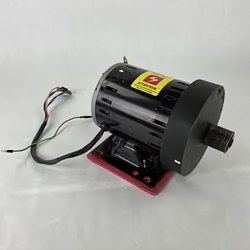AC vs. DC Motors on Treadmills: Understanding the Differences
Mar 4th 2024
When it comes to treadmills, one of the key components that directly impacts performance and functionality is the motor. Treadmill motors typically come in two types: AC (alternating current) and DC (direct current). Understanding the differences between these two motor types can help you make an informed decision when purchasing or maintaining a treadmill. In this blog post, we'll delve into the distinctions between AC and DC motors on treadmills and their respective advantages and disadvantages.
AC Motors:
1. Power and Durability: AC motors are known for their robustness and ability to generate high levels of power, making them suitable for heavy-duty use in commercial gym settings.
2. Continuous Operation: AC motors are designed for continuous operation, allowing for longer workout sessions without overheating or performance degradation.
3. Smooth Performance: AC motors provide consistent and smooth speed control, ideal for maintaining steady pacing during workouts.
4. Maintenance Requirements: While AC motors are durable, they may require more maintenance due to their complexity and reliance on components such as brushes and capacitors.
DC Motors:
1. Energy Efficiency: DC motors are generally more energy-efficient than AC motors, consuming less power during operation. This makes them an attractive option for home treadmills where energy conservation is a priority.
2. Quiet Operation: DC motors operate more quietly compared to AC motors, resulting in a quieter treadmill experience that is conducive to home use.
3. Speed Control: DC motors offer precise speed control, allowing users to adjust speed settings with greater accuracy and responsiveness.
4. Compact Size: DC motors are typically smaller and lighter than their AC counterparts, making them easier to integrate into compact treadmill designs.
Conclusion:
When choosing between AC and DC motors for your treadmill, it's essential to consider your specific needs and usage requirements. AC motors excel in commercial environments where durability and continuous operation are paramount, while DC motors offer energy efficiency and quiet operation ideal for home use. Ultimately, the choice between AC and DC motors will depend on factors such as budget, intended use, and personal preferences. By understanding the differences outlined in this blog post, you can make an informed decision that aligns with your fitness goals and lifestyle.

